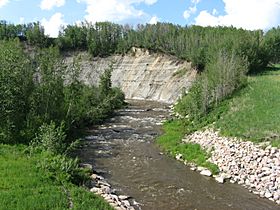Lobstick River facts for kids
Quick facts for kids Lobstick River |
|
|---|---|

Lobstick River before its confluence with the Pembina River
|
|
| Country | Canada |
| Province | Alberta |
| Physical characteristics | |
| Main source | Lobstick River Headwaters 1,035 m (3,396 ft) 53°26′44″N 115°54′40″W / 53.44556°N 115.91099°W |
| River mouth | Pembina River 730 m (2,400 ft) 53°36′33″N 114°59′59″W / 53.60917°N 114.99972°W |
The Lobstick River is a small but interesting river located in west-central Alberta, Canada. It starts in the foothills and flows north, eventually reaching Chip Lake. From there, it turns eastward, passing by the community of Lobstick. Finally, it joins the Pembina River, which then flows into the larger Athabasca River.
Contents
What's in a Name? The Story of Lobsticks
The Lobstick River gets its unique name from an old practice during the fur trade era. Back then, people would create special markers called "lobsticks" or "lopsticks."
How Lobsticks Were Made
A lobstick was a tall tree that had its branches removed, except for a few at the very top. This made the tree stand out. Sometimes, the bark was also peeled off to make it even more noticeable.
Why Lobsticks Were Important
These special trees were used as important landmarks. They helped travelers, especially fur traders, find their way through the wilderness. A lobstick could mark a good camping spot, a portage route, or a place where trails met. They were like natural signposts in the vast Canadian landscape.
Where Does the Lobstick River Flow?
The Lobstick River begins its journey in the western part of Alberta. It flows generally north from the foothills.
Journey Through Chip Lake
After flowing north, the river enters Chip Lake. This lake is an important part of the river's path.
Meeting the Pembina River
From Chip Lake, the Lobstick River changes direction and flows eastward. It passes by the small community of Lobstick. Eventually, the Lobstick River joins the Pembina River. The Pembina River then continues its flow until it meets the mighty Athabasca River.
Rivers and Creeks Joining the Lobstick
As the Lobstick River travels from its beginning to where it joins the Pembina River, it collects water from several smaller streams and a lake. These are called tributaries.
Main Tributaries of the Lobstick River
Here are the streams and lake that add water to the Lobstick River:
- Brule Creek
- Little Brule Creek
- Chip Lake
- Poison Creek
 | Charles R. Drew |
 | Benjamin Banneker |
 | Jane C. Wright |
 | Roger Arliner Young |

